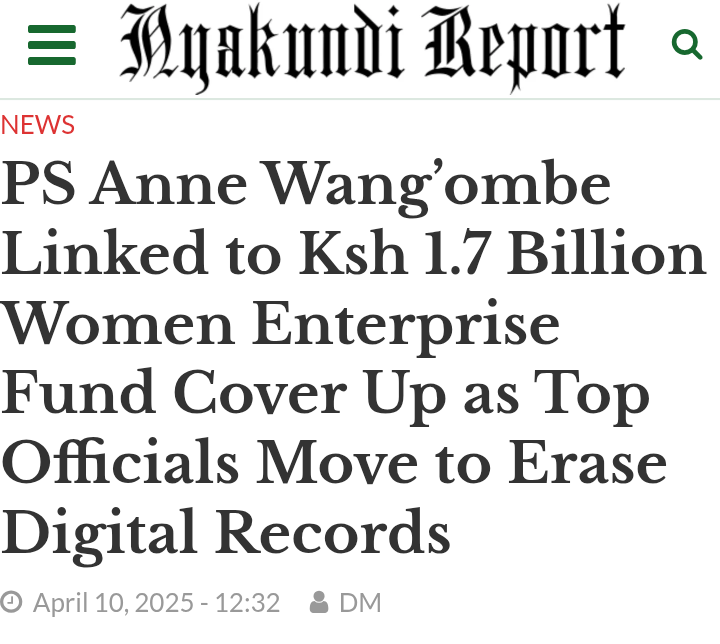A scandal has emerged at the Women Enterprise Fund, now linked to a possible cover-up of over Ksh 1.7 billion.
As reported by Cyprian Is Nyakundi, the spotlight has turned on Public Service Principal Secretary Anne Njoki Wang’ombe, who is said to have blocked an internal forensic audit that might have uncovered widespread financial mismanagement.
The Fund, which falls under the State Department for Gender and Affirmative Action led by PS Wang’ombe, has been in the middle of investigations after the Auditor General flagged several financial irregularities.

Internal reports had already shown unverified transactions, missing income records, inflated expenses and unexplained withdrawals that added up to more than Ksh 1.4 billion.
Sources from within the Fund revealed that Wang’ombe directly intervened to stop the planned forensic audit, despite a board decision that approved the exercise. It was suspected that this audit could reveal losses even bigger than what was seen in the normal Auditor General’s review.
Around the same time, digital logs from the Fund’s main system were reportedly deleted under the watch of the ICT manager.
These logs contained vital data about mobile money transfers, loan repayments and approvals. Insiders say this information could have revealed how over Ksh 212 million moved through unauthorized PayBill numbers, going against Executive Order No. 2 of 2023 which required all government payments to be centralized under PayBill number 222222.
There were also reports that Ksh 400,000, listed as per diem for external auditors, was instead wired into the personal accounts of Deputy Finance Manager Felix Aketh and another officer named Winfrida Ogula.
No documentation such as travel approvals or hotel bookings were provided to support the payments. Credit Manager Raphael Kimolo is said to have authorized the transaction and is also accused of clearing SACCOs that owed nearly Ksh 10 million, money that remains unaccounted for.
All this was happening while the Fund was reporting a sharp drop in profits down 49 percent and an overall loss of Ksh 330 million in the period ending June 2024.
The rot doesn’t stop there. A computer maintenance budget of Ksh 68 million had a Ksh 59 million gap, as only Ksh 9 million could be traced in the records. Staff salaries listed at Ksh 374 million didn’t match actual disbursements, which came to Ksh 369 million.
This raised concerns about possible ghost workers or secret allowances. The Fund also held 43 board meetings in just one year, a number considered too high, with some insiders saying the meetings were used to approve shady financial deals rather than provide oversight.
There were also concerns over why the Fund continued to use three different PayBill accounts long after the order to switch to a single system.
The money held in these accounts was later shifted into call deposits, a move that could violate public finance rules since there was no formal communication to the Treasury or Controller of Budget.
Another Ksh 71.3 million, given out as loans to women’s groups, was flagged as lost, with no legal efforts made to recover it.What is now becoming clear is that the failure to protect public funds was not accidental.
Instead, it appears to be the result of deliberate decisions made by high-level officials to hide the truth. Whistleblowers have called for an independent investigation, pointing fingers directly at PS Wang’ombe for blocking the audit and turning a blind eye to missing funds under her watch.
They now want urgent action, hoping that the culprits behind this scandal will be brought to justice before more public money disappears.

